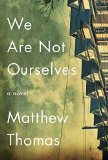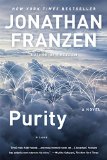Summary | Excerpt | Reading Guide | Reviews | Beyond the book | Read-Alikes | Genres & Themes | Author Bio

We Are Not Ourselves is the perfect distillation of the American dream as played out in the twentieth century. At the center of this brilliant debut is Eileen Tumulty Leary, a daughter, wife, and mother, whose fortunes improve with the rising tide of middle-class mobility, but who then finds herself corseted by the very men who are closest to her.
Growing up under the shadow of a strict Irish father and a depressed mother in 1940s Woodside, Queens, Eileen is wise enough to know that her only ticket to escape is to irrevocably bind her fortunes to those of an ambitious, upwardly mobile young man. Education might help increase the odds of finding just such a person so she qualifies to become a nurse. At first glance, Ed Leary doesn't seem to be the man of her dreams: he is serious, a man of science, obsessed with his research. But Eileen is nothing if not practical. Ed, she realizes, might not be her type, but he will deliver to her the American dream: a house in a tony neighborhood and all the other attendant comforts of a solidly middle class life. Along with marriage comes a move to the second floor of a three-family home in Jackson Heights. Not quite the upscale address or home she was looking for, but perhaps it will do.
As Jackson Heights slowly begins to experience white flight (see Beyond the Book), Eileen's desperation to move to a single-family home in a "better" neighborhood soon becomes all-consuming. Author Matthew Thomas portrays her increasing obsession by relentlessly chronicling her every move toward her end goal: "The closing down of possibilities had begun, almost imperceptibly. She had to act quickly to preserve her image of the life she imagined." The repetitive nature of Eileen's thoughts are the only portions of the novel where the story sags a little. When the Learys finally move into a fixer-upper in the area that Eileen covets, life delivers new roadblocks. Ed's resistance to his wife's plans seem stubborn at first but there are deeper, more worrisome reasons for his intransigence.
Through the lens of one all-American family, Thomas has crafted a profound meditation on the meaning of success, the joys and challenges of marriage, and the lure (and traps) of the American dream. Eileen Leary, with all her strengths and weaknesses, leaps off the page. A dedicated wife and mother, she is unsure how to react to circumstances that veer too far from the script. She is not racist, Thomas assures us, but she is still uncomfortable with the increasing number of colored faces around her. Eileen's life also turns out to be a perfect capture of the arc of women's rights in twentieth-century America. Any taste of "freedom" she might achieve through her work as a nurse is nevertheless constrained by her duties to family. It is frustrating to watch her drive being dampened over and over again by either circumstance or the men in her life. Yet with the can-do optimism probably epitomized by women of her generation, Eileen manages to hang on and stay afloat, coming to terms with compromise in practically every aspect of her life including her improbable yet enduring marriage. It might be true that "living with [Ed] made his eccentricities curdle into pathologies," but Eileen is a steadfast partner - through sickness and in health.
Above all, Ourselves speaks to us primarily because Eileen's disillusionment and faded hopes mirror so many of ours: "She didn't like to acknowledge that people with real ability might not arrive at comfortable stations in life. She had achieved professional status but her existence wasn't ideal, and hard as she tried to hack her way through the thicket of middle-class living, she couldn't find a way out to the clearing." Sound familiar? That she soldiers on and finds life's purpose anyway, is hope that even in our darkest hour, there's always a silver lining.
![]() This review
first ran in the August 13, 2014
issue of BookBrowse Recommends.
This review
first ran in the August 13, 2014
issue of BookBrowse Recommends.

If you liked We Are Not Ourselves, try these:

by Ann Patchett
Published 2017
The acclaimed, bestselling author - winner of the PEN/Faulkner Award and the Orange Prize - tells the enthralling story of how an unexpected romantic encounter irrevocably changes two families' lives.

by Jonathan Franzen
Published 2016
A magnum opus for our morally complex times from the author of Freedom
Discovery consists of seeing what everybody has seen and thinking what nobody has thought.
Click Here to find out who said this, as well as discovering other famous literary quotes!
Your guide toexceptional books
BookBrowse seeks out and recommends the best in contemporary fiction and nonfiction—books that not only engage and entertain but also deepen our understanding of ourselves and the world around us.